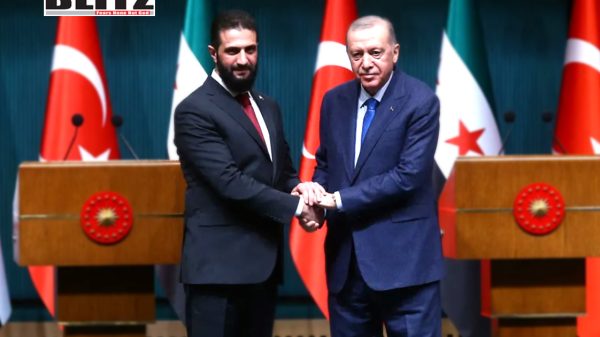Türkiye forges new alliances with Syria and Iraq
- Update Time : Tuesday, February 11, 2025

Türkiye is taking significant steps toward reshaping its regional security strategy by forging new alliances with neighboring countries, particularly Syria and Iraq. In a development that signals a major shift in Ankara’s approach to the Middle East, reports have emerged that Türkiye and Syria are considering a joint defense pact. While Turkish officials have denied discussions over establishing military bases in Syria, they have not refuted claims that Ankara is supporting efforts to bolster the capacity of the Syrian army. This marks a critical turning point in Türkiye-Syria relations, especially given Türkiye’s long-standing support for opposition forces during the Syrian civil war.
For years, Türkiye played a decisive role in supporting Syrian opposition groups against the Assad regime. However, recent geopolitical shifts have necessitated a recalibration of this policy. With President Ahmad Al-Sharaa now at the helm in Syria, the possibility of military cooperation between the two countries is emerging. A defense pact that includes training for Syria’s new army would not only signal a major diplomatic breakthrough but also align with Türkiye’s broader strategy of stabilizing its borders and combating terrorism.
Türkiye’s outreach to Syria mirrors its recent engagement with Iraq, where a memorandum of understanding was signed last year, focusing on military training and defense cooperation. The agreement between Ankara and Baghdad marked a significant step in strengthening security collaboration between the two nations. Turkish President Recep Tayyip Erdogan emphasized that this accord aimed to enhance the capabilities of Iraqi security forces, foster dialogue on counterterrorism efforts, and contribute to regional stability. The successful implementation of this agreement has now set the stage for a similar understanding with Syria.
A key driving force behind Türkiye’s rapprochement with Syria and Iraq is its long-standing battle against the Kurdistan Workers’ Party (PKK) and its affiliated groups, such as the Syrian-based YPG. These groups have been a persistent security concern for Ankara, often operating from bases in northern Iraq and Syria. Historically, Türkiye’s military operations in Iraq, particularly in the Bashiqa camp near Mosul, strained relations between the two countries. However, the new defense agreement between Ankara and Baghdad has led to the establishment of a joint training and cooperation center in Bashiqa, with operational control under the Iraqi armed forces. This arrangement reflects Baghdad’s growing willingness to collaborate with Türkiye in countering the PKK’s influence.
Similarly, Syria’s new leadership under Al-Sharaa has expressed its intent to prevent the PKK and YPG from using Syrian territory as a launchpad for operations against Türkiye. This marks a stark departure from the policies of the Assad regime, which often exploited Kurdish militants as a bargaining chip in regional negotiations. With both Syria and Iraq now taking concrete steps to curb PKK activities, Ankara sees an opportunity to foster a more cooperative security framework with its neighbors.
Türkiye’s efforts to build defense partnerships with Syria and Iraq are not without historical precedent. The country has previously engaged in regional security arrangements to address shared threats. One of the earliest examples was the Saadabad Pact of 1937, signed between Türkiye, Iraq, Iran, and Afghanistan. This defense accord was aimed at fostering regional stability in the face of external pressures but was ultimately short-lived due to World War II.
Another significant initiative was the Baghdad Pact of 1955, established to counter Soviet influence during the Cold War. Although the pact disintegrated after Iraq’s withdrawal in 1958, it demonstrated Türkiye’s historical inclination toward multilateral security cooperation. Today, Ankara’s push for military collaboration with Syria and Iraq can be seen as an extension of this tradition, adapted to contemporary geopolitical realities.
Beyond addressing the PKK threat, Türkiye is also advocating for a broader regional coalition to combat the remnants of Daesh. Turkish Foreign Minister Hakan Fidan recently announced plans for joint counterterrorism efforts involving Türkiye, Iraq, Syria, and Jordan. He emphasized that these nations possess the capability to eliminate Daesh without external intervention, stating, “God willing, this is the step we will take as four countries in the near future. We have already held preliminary talks for this process.”
If implemented, this initiative could have significant implications for Western involvement in the region. The U.S. currently backs YPG elements in Syria under the pretext of fighting Daesh. However, a homegrown regional coalition led by Türkiye could reduce Washington’s leverage and force a reevaluation of its support for Kurdish militant groups. This, in turn, would strengthen Ankara’s hand in negotiating future security arrangements in northern Syria.
Defense pacts often serve as a precursor to deeper economic collaboration, and Türkiye’s agreements with Iraq and Syria are no exception. One of the most pressing economic issues between these nations is water management. Türkiye, Iraq, and Syria share key transboundary river basins, and disputes over water resources have long been a source of tension. However, Ankara’s defense agreement with Baghdad has already paved the way for a multibillion-dollar water-sharing deal, demonstrating how security cooperation can facilitate economic partnerships.
A similar arrangement could be pursued with Syria, turning water from a point of contention into an area of collaboration. With all three countries working together on security and counterterrorism, trust-building measures in economic sectors such as water management, trade, and infrastructure development could follow. Such an approach would contribute to regional stability by ensuring that economic interdependence complements security alliances.
While Türkiye’s evolving regional strategy presents promising opportunities, it also comes with challenges. For one, domestic opposition within Syria and Iraq could complicate the implementation of defense agreements. Certain factions in both countries remain wary of Turkish influence and could resist closer military cooperation. Additionally, external actors such as the U.S. and Russia may attempt to counter Ankara’s initiatives to maintain their own strategic footholds in the region.
Nevertheless, the benefits of a coordinated security framework outweigh the challenges. By aligning with Syria and Iraq on counterterrorism efforts, Türkiye can significantly diminish the PKK’s operational capabilities while fostering long-term stability. Furthermore, economic cooperation stemming from these agreements could unlock new avenues for regional development, ensuring that security collaboration is not merely a temporary measure but a foundation for sustained partnership.
Türkiye’s pivot toward regional security alliances with Syria and Iraq marks a significant shift in its foreign policy approach. By prioritizing counterterrorism efforts and defense collaboration, Ankara is positioning itself as a key stabilizing force in the Middle East. The historical precedents of regional security pacts, coupled with the potential for economic cooperation, suggest that these agreements could redefine Ankara’s relationships with its neighbors for years to come. As Türkiye, Syria, and Iraq continue their diplomatic engagements, the success of these initiatives will ultimately depend on their ability to translate military coordination into broader political and economic partnerships.
















Leave a Reply